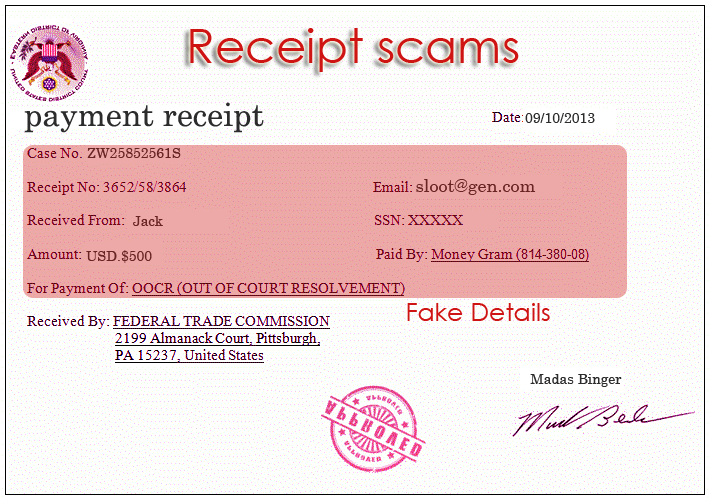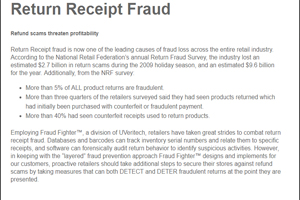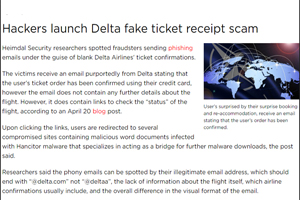Receipt Scams
- Stay away from online auction sites
- Purchase gift cards directly from the stores that is issuing gift cards
- Examine both the front as well as back side of the gift cards before purchasing
- Request the cashier to scan the gift card in front of you
- Dial the gift card company and ask the balance that is available in the gift cards
- Do not provide pin number, passwords, social security number, date of birth and other such personal details to any third parties or strangers
- Do not purchase gift cards that are sold on the racks of the shops
- Inform to the shopkeeper if some unknown person is watching all your activities
Scams related to payment receipt are also becoming very popular. Scammers will prepare payment receipts which will look like original receipts of some of the branded companies. After preparing the stamped payment receipts they will send it to various mails and request the people to claim the additional payment done in these companies. Innocent people will open the mail of the scammers and will follow their instructions. They will be directed to illegitimate website which will also look like a popular website. This website will prompt the public to provide all the financial and personal details like credit card number, pin number, validity and other such details. When the public provides the information on the website the scammers will immediately hijack the personal details and siphon off the money. Public those who are receiving these types of mails should never reply to these scammers and open the websites that are created by them. They should check the authenticity of the sender and also perform serious background checks. If they find that these are phishing mails from the scamming world they should immediately report it to police or other revenue authorities. Scams related to duplicate receipts, card receipts and cash back receipts are also becoming famous on the internet.
Receipt scams involve deceptive practices where fraudsters create fake or manipulated receipts to deceive individuals or businesses. Common tactics include generating fictitious purchase receipts for non-existent transactions, submitting false expenses in corporate settings, or fabricating invoices for services never rendered. Scammers may exploit these fake receipts to initiate refund scams, billing schemes, or even tax evasion. In online transactions, individuals might receive fake receipts from scammers aiming to trick them into making unwarranted payments for goods or services. To protect against receipt scams, it's crucial to verify the authenticity of receipts, regularly monitor expenses for discrepancies, safeguard personal information, educate employees about receipt fraud, use reputable platforms for online transactions, and exercise caution when receiving unexpected receipts or invoices.
Receipt scams involve deceptive practices where fraudsters use fake receipts, invoices, or payment requests to exploit individuals or businesses. Common tactics include phishing emails with fraudulent attachments, fake purchase receipts for non-existent goods or services, and overpayment scams requesting refunds for fabricated transactions. Business email compromise (BEC) may lead to compromised accounts sending false payment requests. Additionally, scammers use false subscription renewal notices, fake donation receipts, and fabricated tax refund claims to deceive individuals. In online marketplaces, fraudsters provide fake payment confirmations to trick buyers. To protect against receipt scams, verify transactions independently, use secure communication channels, and be cautious of unsolicited or suspicious requests. Implementing strong cybersecurity measures and educating individuals about common scam tactics is essential for prevention.





